Sacraments, Funerals, & Other Rites
Baptism
Baptism
What is the Sacrament of Baptism?
 The first three sacraments are Baptism, Confirmation, and Eucharist. They are called the“Sacraments of Initiation”. We are reborn in Baptism, strengthened by the sacrament of Confirmation, and receive in the Eucharist the food of eternal life. (CCC#1212) Holy Baptism is the basis for all Christian life, the gateway to the life in the Spirit. It is also the door which gives access to all other sacraments. Without Baptism we cannot receive any other sacrament.
The first three sacraments are Baptism, Confirmation, and Eucharist. They are called the“Sacraments of Initiation”. We are reborn in Baptism, strengthened by the sacrament of Confirmation, and receive in the Eucharist the food of eternal life. (CCC#1212) Holy Baptism is the basis for all Christian life, the gateway to the life in the Spirit. It is also the door which gives access to all other sacraments. Without Baptism we cannot receive any other sacrament.
Through Baptism:
- we are freed from the bondage of sin
- we are reborn as children of God
- we are incorporated into Christ
- we become members of the Church and are made sharers in her mission (CCC #1213)
- we share in the Royal Priesthood of Christ (common priesthood of the faithful)
Baptism is only given once. It imprints in the soul an indelible spiritual mark, the “character”, which is the sign of Jesus Christ. (CCC #1304)
To read more:
Catechism of the Catholic Church (1212-1284)
Baptism at Holy Faith Catholic Church
Confirmation
Confirmation
What is the Sacrament of Confirmation?
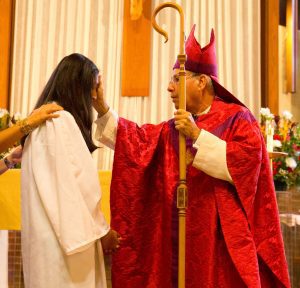 The Sacrament of Confirmation, like Baptism, also imprints the Christian with the “character” as the sign of the mark of Jesus Christ, now with the seal of his Spirit to strengthen the person to be a Christian witness. By this sacrament, our common priesthood is perfected, and our bond with the Church is enriched with a special strength of the Holy Spirit. As true witnesses of Christ, we become more strictly obliged to spread and defend the faith by word and deed. (CCC: #1295-1301)
The Sacrament of Confirmation, like Baptism, also imprints the Christian with the “character” as the sign of the mark of Jesus Christ, now with the seal of his Spirit to strengthen the person to be a Christian witness. By this sacrament, our common priesthood is perfected, and our bond with the Church is enriched with a special strength of the Holy Spirit. As true witnesses of Christ, we become more strictly obliged to spread and defend the faith by word and deed. (CCC: #1295-1301)
The sign of the sacrament of Confirmation is the anointing with the Sacred Chrism Oil. In the Latin Rite of the Roman Catholic Church, the ordinary minister of this sacrament is the Bishop. In extraordinary circumstances (e.g. baptism of anyone older than 7 years of age), the Bishop gives permission for the Pastor or a Priest to administer the sacrament. The age of Confirmation is determined by the local Bishop in each diocese, and therefore the age may vary from diocese to diocese.
To read more
Catechism of the Catholic Church (1285-1305)
Confirmation at Holy Faith Catholic Church
Eucharist
Eucharist
What is the Sacrament of Eucharist?
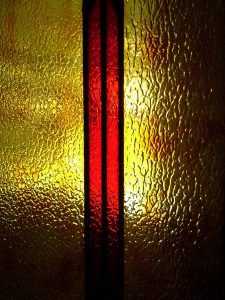 Those who now have the dignity of the royal priesthood by Baptism participate with the whole community in the Holy Eucharist: the memorial, sacrifice, and banquet of the Lord Jesus Christ. The Eucharist completes the sacraments of initiation but afterwards continues to be the “source and summit” of the Christian life.
Those who now have the dignity of the royal priesthood by Baptism participate with the whole community in the Holy Eucharist: the memorial, sacrifice, and banquet of the Lord Jesus Christ. The Eucharist completes the sacraments of initiation but afterwards continues to be the “source and summit” of the Christian life.
The Eucharist is primarily a sacrificial offering, in memory of Jesus Christ, his death and resurrection, through the visible sign of communion: eating & drinking the Body and Blood of the resurrected Lord(Real Presence). It is the greatest sign of unity and the most “visible expression of the Church”.
Traditionally, from its roots in Jewish tradition, the Eucharist is a public act of worship of praise & tranksgiving that must lead us to live the sacrificial love of Christ in service of others (John 13:1-15 – Gospel of Holy Thursday)
The celebration every Sunday Eucharist, the Lord’s Day of Resurrection, is an obligation for all Catholics. “Full, conscious, and active participation is demanded” from all the faithful at all Eucharistic gatherings. (CSL #14)
To read more
Catechism of the Catholic Church (1322-1381)
Constitution on the Sacred Liturgy
Eucharist at Holy Faith Catholic Church
RCIA (Rite of Christian Initiation of Adults)
Penance & Reconciliation
Penance & Reconciliation
What is the Sacrament of Penance & Reconciliation
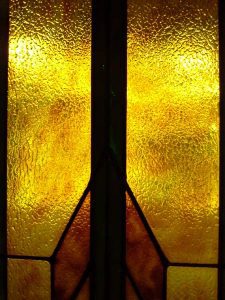 The new life received in Christian initiation has not abolished the frailty and weakness of human nature, nor our inclination to sin. This inclination still which remains in the baptized (adapted from CCC 1426). We approach the Sacrament of Penance & Reconciliation to obtain pardon from God’s mercy for our offenses, and to reconcile with the Church which we have wounded by our sins (CCC #1422). “Sin is before all else an offense against God, a rupture of communion with him. At the same time it damages communion with the Church.” (CCC #1440). Penance & Reconciliation are expressed and accomplished liturgically by this sacrament.
The new life received in Christian initiation has not abolished the frailty and weakness of human nature, nor our inclination to sin. This inclination still which remains in the baptized (adapted from CCC 1426). We approach the Sacrament of Penance & Reconciliation to obtain pardon from God’s mercy for our offenses, and to reconcile with the Church which we have wounded by our sins (CCC #1422). “Sin is before all else an offense against God, a rupture of communion with him. At the same time it damages communion with the Church.” (CCC #1440). Penance & Reconciliation are expressed and accomplished liturgically by this sacrament.
The Sacrament of Penance & Reconciliation is fundamentally a joyful encounter with God’s loving mercy and forgiveness and the Church’s reconciling embrace. It requires in response a contrite heart, confession with lips, practice of humility, and fruitful satisfaction.
Read More:
Catechism of the Catholic Church (1422-1498)
Reconciliation & Penance at Holy Faith Catholic Church
Children’s First Reconciliation
Confession (Individual) times at Holy Faith
Sacrament of Holy Orders
Sacrament of Holy Orders
What is the Sacrament of Holy Orders?
 The Sacrament of Holy Orders is the sacrament through which the mission entrusted by Christ to his apostles, continues to be exercised in the Church until the end of time. This is a sacrament of apostolic ministry. It included three degrees: episcopate (bishop), presbyterate (priest), and diaconate (deacon).
The Sacrament of Holy Orders is the sacrament through which the mission entrusted by Christ to his apostles, continues to be exercised in the Church until the end of time. This is a sacrament of apostolic ministry. It included three degrees: episcopate (bishop), presbyterate (priest), and diaconate (deacon).
All Christians participate in the one priesthood of Christ. The whole community of believers is, as such, priestly. Through the sacraments of Baptism and Confirmation the faithful are “consecrated to be…a holy priesthood.” Those who, after being baptized, receive the Sacrament of Holy Orders, also become part of the ministerial or hierarchical priesthood. The ministerial priesthood is at the service of the common priesthood of all the baptized. It is intended to unfold the baptismal grace of all Christians. The ministerial priesthood is the means by which Christ continues to build up and lead his Church.
To read more:
Catechism of the Catholic Church (1536-1600)
Fr. John’s Faith Focus section on Ordained Ministry
Sacrament of Holy Orders at Holy Faith Catholic Church
Discerning a Vocation to the Priesthood?
Contact Fr. John Phillips: or Fr. Emmanuel:
Various Orders of Priest Religious (Coming Soon)
Sacrament of Matrimony
Sacrament of Matrimony
What is the Sacrament of Matrimony?
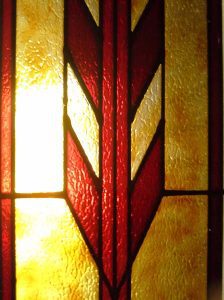 The Catholic Church believes Marriage is a covenant by which a man and a woman establish between themselves a partnership for the whole life. This partnership, by its very nature, is for the good of the spouses and the procreation and education of their children. When this covenant is made by two baptized persons, it is a sacrament: a sign of the covenant between Christ and his Church. (CCC #1601)
The Catholic Church believes Marriage is a covenant by which a man and a woman establish between themselves a partnership for the whole life. This partnership, by its very nature, is for the good of the spouses and the procreation and education of their children. When this covenant is made by two baptized persons, it is a sacrament: a sign of the covenant between Christ and his Church. (CCC #1601)
God himself is love, and He created every human being, man and woman, in His image and likeness. Therefore, love is the fundamental and innate vocation of every human being. The mutual love between a man and a woman becomes an image of the absolute and unfailing love of God.
Marriage in the Catholic Church is a celebration of the whole Church community. The spouses themselves are the ministers of the marriage and they confer the Sacrament of Matrimony upon each other by expressing their consent before the Church. Their marriage, as a sacrament, becomes then a sign of Christ’s love and commitment to the Church.
The Sacrament of Marriage, requires a period of preparation according to Church and Civil law. The liturgical celebration(Wedding), is governed by the Liturgical Rite of Marriage and its norms.
To read more:
Catechism of the Catholic Church (1601-1666)
Sacrament of Matrimony at Holy Faith Catholic Church
Guidelines for Weddings: Liturgy & Music
The Anointing of the Sick
The Anointing of the Sick
What is the Sacrament of The Anointing of the Sick?
 The Anointing of the Sick is one of the Sacraments of the Church especially intended to strengthen those who are being tried by illness (CCC #1511). The Roman Rite says that “the sacrament of the Anointing of the Sick is given to those who are seriously ill by anointing them on the forehead and hands with duly blessed oil”.
The Anointing of the Sick is one of the Sacraments of the Church especially intended to strengthen those who are being tried by illness (CCC #1511). The Roman Rite says that “the sacrament of the Anointing of the Sick is given to those who are seriously ill by anointing them on the forehead and hands with duly blessed oil”.
This sacrament, however, is not only for those who are at the point of death, but also for anyone of the faithful who is sick or is of old age. “If a sick person who received this anointing recovers his health, he can in the case of another grave illness receive this sacrament again. If during the same illness the person’s condition becomes more serious, the sacrament may be repeated. It is fitting to receive the Anointing of the Sick just prior to a serious operation. The same holds for the elderly whose frailty becomes more pronounced.” (CCC #1515)
In addition, the Viaticum (Eucharist received at the moment of death: “passing over to the Father”) can be offered as a sacrament of passing over from “death to life, from this world to the Father”.
The Anointing of the Sick and the Eucharist as Viaticum are the sacraments that complete the earthly pilgrimage. (CCC #1525)
To read more:
Catechism of the Catholic Church (1499-1532)
Anointing of the Sick at Holy Faith Catholic Church
Hospitals, Nursing Homes, Assisted Living Facilities, Hospice (Coming Soon)
How to request the Sacrament of Anointing at any age (Coming Soon)
Outreach Ministry (to the Sick) (Coming Soon)
Funerals at Holy Faith
Funerals at Holy Faith Catholic Church
At Holy Faith Catholic Church we want to walk with you and your family through this difficult process of loss. We are here to help you and guide you along the way, and to support you in the days and weeks to come after the funeral services. The following are some points that may be helpful as you prepare for this process:
-
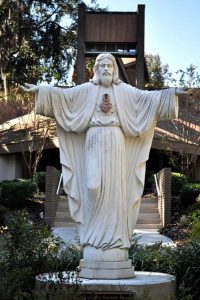 When your loved one has passed away (expected or unexpected), you need to contact the church as soon as possible at (352)376-5405. If it is after 3:00 pm, at any time evening or during the night, an answering service will respond and will connect you to the priest on call. The priest will guide you from there on with the steps you need to take. If you have already made arrangements with a Funeral Home they are also able to contact us at any time.
When your loved one has passed away (expected or unexpected), you need to contact the church as soon as possible at (352)376-5405. If it is after 3:00 pm, at any time evening or during the night, an answering service will respond and will connect you to the priest on call. The priest will guide you from there on with the steps you need to take. If you have already made arrangements with a Funeral Home they are also able to contact us at any time.- The priest or Pastoral Associate will help you arrange with your family and the Funeral Home the best time to have the funeral services. We take into consideration your family’s needs, the Church’s calendar, the Priest’s schedule, and the schedule of the Funeral Home. We will work with you on the best and most convenient date for all involved.
- Holy Faith Catholic Church celebrates funerals Masses Monday-Friday at 9:30 am, and on Saturdays at 9:00 am. These are the usual Daily Mass times and those who assist to daily Mass are always happy to be there in prayer and support to you and your family.
- The Priest will arrange to meet with you and your family to finalize the details of the arrangements and to discuss the Funeral Liturgy and the options available. The Church follows the prescribed Ritual for Christian Burial and Funeral Massaccording to the Roman Catholic Church, and follows the guidelines and directives from the Diocese of St. Augustine. In this process of preparation we will also take into consideration any appropriate special adaptations or requests.
- Pictures, mementos, flowers, and other memorabilia are welcomed. The Church personnel and the Funeral Home will assist you with the placement of these items.
- Holy Faith Catholic Church does not offer Funeral Receptions, however, if the space is available, we can offer the Upper Hall for the family and friends to gather after the funeral Mass. Coffee will be provided and you can make arrangements with a caterer,or people can bring food if they wish to do so. The Gazebo, in the patio outside the Church, is also a wonderful place to gather after the funeral Mass, if weather permits. There is space to arrange any food or drink that people bring. In most instances, this is the preferred space to gather for a small reception.
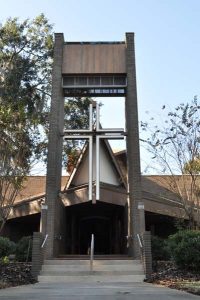 Cremation is permitted in the Catholic Church, and for many people this is the most acceptable option. The Church prefers that the funeral services be performed with the body present, leaving cremation to take place at a later time after the services or Mass has concluded. However, in many family circumstances it is not possible to wait until after the Funeral Mass to perform the cremation. In these instances, we can have the Funeral Mass with the cremated remains present. This is an acceptable practice in the Catholic Church.
Cremation is permitted in the Catholic Church, and for many people this is the most acceptable option. The Church prefers that the funeral services be performed with the body present, leaving cremation to take place at a later time after the services or Mass has concluded. However, in many family circumstances it is not possible to wait until after the Funeral Mass to perform the cremation. In these instances, we can have the Funeral Mass with the cremated remains present. This is an acceptable practice in the Catholic Church.- Donations & Stipends: Christian Burial for our brothers and sisters in the faith is what we do as Christians and asChurch. It is the right of every baptized person regardless of their ability to contribute to the expenses incurred in the Church. At the same time gratitude is a fundamental disposition of every Christian, and Holy Faith Catholic Church never turns down a contribution or donation given in gratitude. Be assured that Holy Faith Catholic Church, will never refuse or minimize the celebration of funeral services because of financial reasons. For more details refer to Donations for Funeral Services.
- Pre-Planning of Funeral Liturgy: We will be happy to assist you in pre-planning funeral arrangements with the Church for yourself or for a family member. Please contact the office (352) 376-5405 to arrange for an appointment, or, you can contact one of our priests.
The Funeral Mass
The Funeral Mass
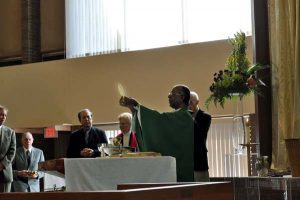 The Christian meaning of death is revealed in the light of the Paschal mystery of the death and resurrection of Christ in whom resides our only hope. The Christian who dies in Christ Jesus is ‘away from the body and at home with the Lord’ (CCC 1681). For the Christian the day of death inaugurates, the fulfillment of his new birth begun at Baptism. The Church accompanies the Christian during the earthly pilgrimage until his or her final journey. The Christian funeral is a liturgical celebration of the Church. The ministry of the Church in this instance aims at expressing communion with the deceased, at the participation of the community gathered for the funeral, and at the proclamation of eternal life to the community (CCC 1684).
The Christian meaning of death is revealed in the light of the Paschal mystery of the death and resurrection of Christ in whom resides our only hope. The Christian who dies in Christ Jesus is ‘away from the body and at home with the Lord’ (CCC 1681). For the Christian the day of death inaugurates, the fulfillment of his new birth begun at Baptism. The Church accompanies the Christian during the earthly pilgrimage until his or her final journey. The Christian funeral is a liturgical celebration of the Church. The ministry of the Church in this instance aims at expressing communion with the deceased, at the participation of the community gathered for the funeral, and at the proclamation of eternal life to the community (CCC 1684).
I. Reception of the Body
At the beginning of the liturgy, we gather at the entrance of the Church to welcome the deceased into the earthly church for the last time. We bless the body/cremains and recall his or her baptism in Christ where they were buried with Christ and with Christ will rise to eternal life.
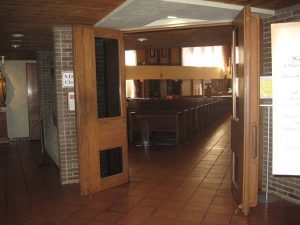 The Reception of the Body consists of:
The Reception of the Body consists of:
- Introduction
- Welcome
- Sprinkling with Holy Water
- Placement of the Pall (omitted with cremated remains)
- Litany of the Saints
- Procession into the Church
II. Liturgy of the Word
The Liturgy of the Word during funerals demands very careful preparation especially because it is common at funerals to have family and friends of the deceased who are not Christians or may not be familiar with the Catholic liturgy. At Holy Faith Church the priest usually selects the scripture readings after having a conversation with the family of the deceased. The sacred scriptures are chosen with the intent of illumining the mystery of Christian death in the light of the risen Christ especially as it applies to the deceased specific journey in life.
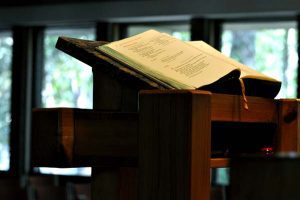 The Liturgy of the Word consists of:
The Liturgy of the Word consists of:
- One Old or New Testament Reading
- A Psalm (sung)
- Gospel Reading
- Homily, and,
- Intercessions
III. Liturgy of the Eucharist
The Holy Eucharist is the heart of the Paschal reality of Christian death. In the Eucharist, the Church expresses her communion with the departed: offering to the Father in the Holy Spirit the sacrifice of the death and resurrection of Christ, and we pray for the deceased to be admitted to participate in the Paschal fullness of the table of the Kingdom.
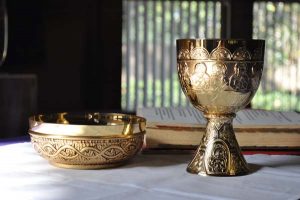 The Liturgy of the Eucharist consists of:
The Liturgy of the Eucharist consists of:
- Presentation & Preparation of the Gifts of bread & wine
- Eucharistic Prayer
- Communion Rite
- Lord’s Prayer
- Sign of Peace
- Breaking of the Bread (Lamb of God)
- Communion with the Body & Blood of Christ
- Prayer after communion
IV. Concluding Ritual: Final Commendation
“A farewell to the deceased is his final ‘commendation to God’ by the Church. It is the last farewell by which the Christian community greets one of its members before his body is brought to its tomb. By this final greeting “we sing for his departure from this life and separation from us, but also because there is a communion and a reunion. For even dead, we are not at all separated from one another, because we all run the same course and we will find one another again in the same place. We shall never be separated, for we live for Christ, and now we are united with Christ as we go toward him… we shall all be together in Christ.”
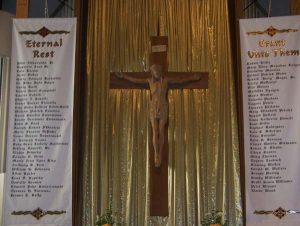 The Concluding Ritual of Farewell consists of:
The Concluding Ritual of Farewell consists of:
- Invitation to silent prayer
- Song of Farewell
- Final Commendation
- Dismissal & Blessing
Music for the Funeral Mass
Music for the Funeral Mass
Music is an essential part of any liturgical celebration, but especially at the celebration of a funeral liturgy where the music expresses our faith in the mystery of Christ, our mourning for the loss of our loved one in the earthly dwelling, and our joy as we live in the hope of resurrection. Music, like the sacred scriptures, is selected based on the same principle of “illumining the mystery of Christian death in the light of the risen Christ, especially as it applies to the deceased specific journey in life.” The music selection must follow the directives of the Roman Catholic Church, and primarily must serve the function and prayer of the Eucharistic liturgy to facilitate and support the full, conscious, and active participation of all the faithful. If you have any special requests or selection that you would like to see included, please let the priest know about them. The priest and the Music Director will select the music for the funeral and will do their best to incorporate any appropriate music that you request, provided it conforms to the demands and requirements of our Roman Catholic Liturgy.
 Other resources:
Other resources:
Funerals Checklist & Practical Information
Contact us for more information:
Holy Faith Catholic Church (Office)
Fr. John Phillips (Pastor)
Letty Valentin (Pastoral Associate & Liturgy Director)
Cristina Logan (Music Director)
